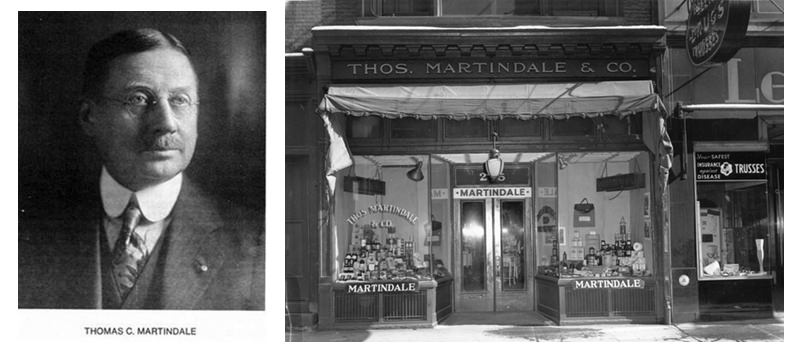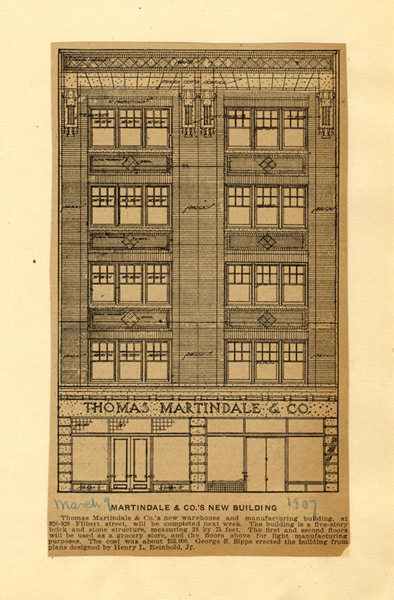Nutritional Visionary – Thomas C. Martindale
Thomas C. Martindale, our store founder’s son, was a pioneer in health and wellness; Philly’s own nutritional visionary. Decades before Dr. Oz, Richard Simmons, or even Jack LaLanne, Thomas C. imported unique dietetic foods for his shoppers starting in 1909. Targeting food to import for the purpose of wellness was a novel idea at the time. He was the first.

Food Represents Health or Misery
Thomas C. explained in a 1938 article in Physical Culture magazine:
“Patrons asked us: “Why do we have to send to England and France for our diabetic foods?”
My father passed this problem to me. I asked these people to bring me any literature or empty cartons of their diabetic foods. This began my first study of health foods as distinct from general groceries…
This has since grown to a very complete line upon which physicians can depend in sending their patients to us.”
This is how Thomas C. became recognized as an advocate for “food consciousness”. No wonder he is recognized as launching Martindale’s as the forerunner of the dietary foods business. Martindale’s is one of the oldest, if not the very oldest American health food store, and it’s still in existence today.
Veggies for Life
Thomas C., pioneer, teacher, and advocate of clean dietary choices, urged others to eliminate or largely limit consumption of meat. He came up with the radical idea of a dining facility downtown during the 1920s to serve Philadelphia prepared salads, soups, vegetable timbales, baked casseroles, and soufflé dishes, all packed with vegetables of every kind. Obviously, meat was not on the menu. Vegetable juices were freshly prepared and enjoyed by folks from all walks of life. Veggies meant life!
On the 1st floor of the premises, twenty seats and a few tables covered with modest muslin cloths were more than satisfactory to the array of diners: bankers, clerks, judges, engineers and more. All manner of folk were blessed with access to low-cost, clean vegetarian food. Baked goods were made without the use of processed sugar, while honey or maple syrup was used instead. Mate tea provided a healthy drink.
Those with food intolerances enjoyed custom designed dishes for their own special diet. They claimed, “There are no regrettable after-effects of Martindale’s lunches”. The Martindale lunchroom closed in 1953.
Thomas C. the Teacher
Under his leadership, the grocery store evolved into the first American health food store. Lines of health-conscious people queried him right there in a little space of the store. He’d conduct  lectures on the 2nd floor of 25 N. 10th St. drawing a significant crowd. Occasionally, he’d invite nutrition-minded speakers to come and address his audience. People would consult with him on personal wellness issues.
lectures on the 2nd floor of 25 N. 10th St. drawing a significant crowd. Occasionally, he’d invite nutrition-minded speakers to come and address his audience. People would consult with him on personal wellness issues.
He further explains,
“When, about 1913, the news flashed around the world of the discovery of the first vitamin and what it meant, I was more convinced than ever that food represented either health or misery, according to how one planned his daily food intake.”
If the man were around today, he’d be a blogger. Articles, brochures, and the like kept the public educated, curious, and students of good health. The Naturopathic College conferred on Thomas C. an honorary degree of Doctor of Natural Philosophy for his many contributions.
Thomas C. taught nutrition and wellness by lecture and in the store while creating a buzz on hot new technology: radio. The early radio program in the 1930s was produced right out of the Martindale 4-story facility from a microphone on the 2nd floor. Of course, his message was the value of good eating habits and the understanding of health issues.
Thomas’ idea of health foods was simple and we could all stand to be reminded of it:
- whole grain
- whole wheat
- no processed sugar
- fiber food
- eliminate junk food
Entrepreneur
Manufacturing of original food products occurred on the 3rd floor. Natural products were produced under the brand “THOMAR” or their own name. A coffee substitute was created from dried figs, thus the name “Figco”. This was accomplished with a drying oven and grinder producing a fig powder. Equipped with this natural product, whose primary purpose was to help wean people off of caffeine, Figco had quite the following.
Another product was Flaxolyn, an aid to constipation, while yet another was THOMAR Thruit Nectar, made of delicious figs, prunes, and raisins drenched in orange blossom honey. In a 1943 news advertisement, we’re told to melt the thick syrup into milk and drink. THOMAR ice cream was the only one known to feature white clover honey and not white sugar.
Thanks to founder Thomas Martindale and health-minded son, Thomas C., for what they started. Springfield is a much healthier community for it.
